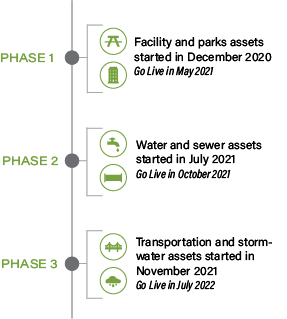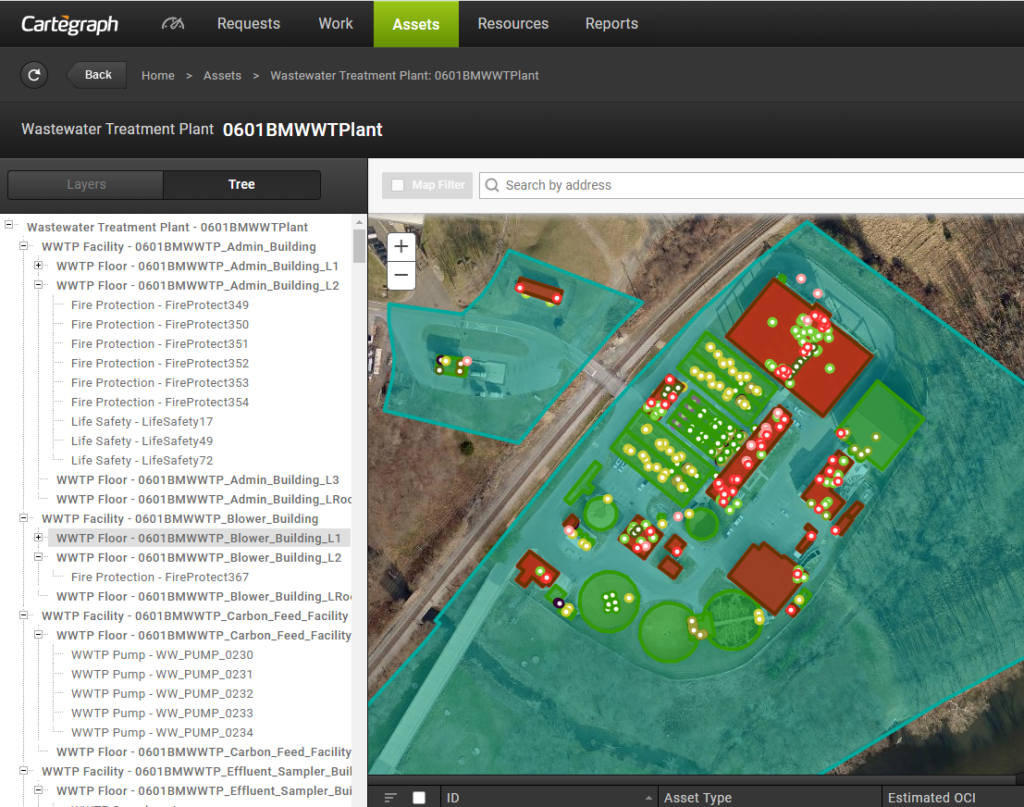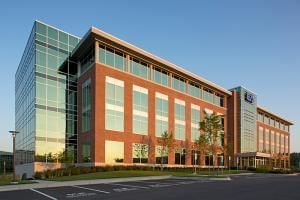
When Chief Administrative Officer Rick Harcum joined Frederick County in 2016, he brought with him a passion for performance management, a conviction that Enterprise Asset Management (EAM) is necessary for long-range planning, and experience from a failed EAM implementation at a different organization. During his prior tenure with a major transit agency, that organization tried unsuccessfully to implement EAM using an array of different tactics and methodologies. He emphasized that the culture of that organization was not ready for EAM, and their employees resisted the new system rather than embracing it.
“Asset Management is a natural evolution of performance management. It facilitates moving from day-to-day to long-term decision making.”
— Rick Harcum, Frederick County Chief Administrative Officer
Rick quickly recognized that several divisions in the County were heavily asset-based and that the culture across the government organization was more welcoming of change. Self-designated as “Cheerleader-in-Charge” for an EAM, he worked with Chief Financial Officer Lori Depies, CPA, a team of managers, and consultants to select and implement a county-wide platform that would support fiscal forecasting beyond the existing 6-year Capital Improvement Program (CIP) through informed quantifiable asset data. Many of the County’s assets have lifecycles measured in decades; however, a 6 year CIP is blind to all investment needs in year 7 and beyond.
Challenge
Founded in the 1700s, Frederick County spans approximately 670 square miles and is home to more than 250,000 residents. The County government owns a wide range of assets, including parks, roads, water and sewer systems, and solid waste transfer stations and landfills. Operation and maintenance are decentralized across multiple divisions—Parks and Recreation, Public Works, Water and Sewer Utilities, etc.—each serving as a standalone unit.
With no universal system in place, each division had previously developed different approaches to budgeting for and managing assets and resources. “We were relying on spreadsheets, file folders, and personal knowledge—people who had spent their entire career with the County,” said Harcum. Systems included a dated software application, a 20-year-old custom database, numerous separate spreadsheets, and pen and paper-based maintenance order ticketing system. During annual budgeting, little data were available to justify division needs for asset upgrades and replacement. “Instead, our budgeting process was usually based on verbal presentations,” he said. “It was an odd situation where we weren’t putting money where it was most needed, but rather who was best able to make a sales pitch.”
With the goal of implementing a combined EAM and Computerized Maintenance Management System (CMMS), Harcum and Depies sought to give voice and a level playing field to County division and department managers responsible for maintaining infrastructure assets. Furthermore, the platform needed to facilitate proactive management of workflows, scheduling of preventative maintenance, strategic prioritization of rehabilitation or replacement, and documentation of institutional knowledge, while balancing the individual needs of various organizations and their resources. For example, the Division of Parks and Recreation focused on cost accounting to understand the effort associated with individual tasks related to required maintenance of specific assets, while the Department of Public Works needed to calculate life expectancy.
“In order to invest in new assets, you must first invest in those you already own. If not, you are digging a deferred maintenance hole that you can’t pull yourself out of.”
— Rick Harcum, Frederick County Chief Administrative Officer
Solution
The County assembled a cross-functional team of administrative leaders, division managers, and information technology specialists to evaluate alternative solutions.
“The entire group felt Cartegraph (link opens in a new tab) was best,” said Depies. Differentiators included a mobile application for real-time, on-the-fly ticketing, ArcGIS geospatial-centric data management, asset setup, prediction curves, and condition triggers. She also noted that no development or programming subcontractors were required for the system.
“We wanted the people who write it and live it every day to be our contacts.”
— Lori Depies, CPA, Frederick County Chief Financial Officer
From a fiscal planning perspective, Cartegraph’s Scenario Builder analytics, forecasting components, and condition targeting features were critical for determining deferred maintenance costs and reserve set up for future needs. Cartegraph met the County’s needs for both capital planning and capital improvement.
Customization and flexibility also played a role in selection. One specific stand-out feature was Cartegraph’s open Application Programming Interface (API) for planned integrations with existing systems, such as the County’s Enterprise Resource Planning (ERP) software.
Implementation
Once they selected Cartegraph for their operations management system, the team moved on to the challenges associated with a complex cross-departmental implementation. After a challenging launch for their new ERP, the County recognized that a third-party specialist was needed for the successful roll-out of Cartegraph. They selected EA to lead the implementation and serve as a champion for the system. Our responsibilities included requirements development, leading meetings, managing all documentation, workflow and integration management, building consensus, and data collection and migration planning.
“You have to have that one person who is the go-to for everyone to pivot around, who is the full-time central hub for all project stakeholders, including vendors and divisions,” said Depies. “EA was in the minutia but also at 10,000 feet with the end goal in mind.”
Planning. As project manager, EA’s first task involved developing a clear and concise statement of objectives to serve as a high-level roadmap for the implementation. Thirteen discovery meetings with more than 50 stakeholders, all held virtually during the beginning of the COVID-19 pandemic, helped identify existing technology solutions that would either provide critical asset information to the system, be replaced by Cartegraph functionality, or require integration. The visioning document outlined the sometimes competing needs of eight different County divisions and laid out a multi-year, multi-phase implementation schedule. EA acted as the intermediary between the County’s budget needs and vision and the division’s day-to-day operational requirements to create alignment and provide information to support data-driven decisions.
“EA focused on strategic goals and working towards those, while Cartegraph worked with our team to develop the solution,” said County Chief Information Officer David Maginnis, CISSP. “EA helped the divisions acknowledge the greater vision and how their operational needs would serve the greater purpose.”
Schedule. From EA’s initial road map, Cartegraph and the County finalized the schedule of implementation:

Geographic Information System (GIS) Data Management and Transformation. The Frederick County Interagency Information Technology (IIT) GIS department hosts and maintains the GIS service used in Cartegraph. EA led efforts to transform existing County data for use in Cartegraph and define custom asset schema. More than 46 custom asset types, such as truck weight kiosks, wastewater treatment blower mixers, electrical panels, and leachate instrumentation, were created as required for different divisions.
Integrations. During initial development of the road map, the team identified several other systems that were integral to the County’s overall EAM goals. Cartegraph developed an integration with the Division of Water and Sewer Utilities customer billing system, Tyler Munis. Water meter tasks initiated in Cartegraph are transferred to Tyler Munis as a service order for action by the Meter Group. IIT also developed a daily job of exporting customer information from the Tyler Munis system, which is then uploaded to the service requestor’s library for tracking customers’ calls in Cartegraph. Separately, EA supported the County’s Phase 2 purchase and implementation of SeeClickFix through integration of the two systems and development of division-specific workflows.
Training. The EA project team led numerous in-house training sessions for staff on the use of the Cartegraph software and took feedback from those sessions to inform configuration changes. Sessions were customized for each division’s workflows and specific users to promote user acceptance. Cartegraph’s Engage module was leveraged to create pop-up and dialogue boxes as guidance for users in understanding division-specific required fields and track usage to identify employees in need of additional support or onboarding.
Results
Frederick County managers and staff were ready for the challenge thanks to the all-in nature of the organization’s culture.
Now entering Phase 3 of the implementation, the County is starting to see returns on the Cartegraph EAM. Within 20 months of the first go-live date, more than 350 users were managing 130 different asset types, such as sewer laterals, water mains, fire hydrants, buildings, and playground equipment, for a total of over 270,000 infrastructure assets. More than 43,000 tasks have been initiated. More importantly, the asset management system is improving workflows within and across divisions.
 Remote Work. Implementation was completed remotely through August 2021. At that time, EA held on site training sessions for the Division of Water and Sewer Utilities as COVID-19 protocols relaxed.
Remote Work. Implementation was completed remotely through August 2021. At that time, EA held on site training sessions for the Division of Water and Sewer Utilities as COVID-19 protocols relaxed.
Geo-Location. Within 6 months of go-live, EA had simplified, georeferenced, and imported existing computer-aided design and drafting files for 40 buildings into GIS in a Cartegraph-specific database schema to provide spatial awareness of work being completed within the building.
Efficiency in the Field. Using the mobile application, Division of Water and Sewer Utilities staff are able to enter their time, equipment, and materials at the job site. They really appreciate having GIS imagery of County assets to lead them directly to where maintenance or action is needed. Employees in the Division of Parks and Recreation, an early implementation adopter, went from filing paperwork every Friday to using the system to capture data live in the field.
New Insight. Supervisors are seeing the bigger picture in realizing actual costs associated with a facility or a park’s events. This broad view aids in integrating high-level and long-range goals and is informing day-to-day decision-making. As an example, EA recommended the County apply Cartegraph’s wastewater treatment plant roll-up functionality to smaller water and wastewater assets such as remote pump and booster stations to provide a quick reference on the level of effort required to maintain each facility.

Accessible Information. Water and sewer users appreciate information that rolls up through the container-component relationship. Information that was previously unknown, like tasks completed and dollar value spent on an asset, are immediately available.
Constituent Service. Through an integration with SeeClickFix, the public can initiate Cartegraph tickets for maintenance. No more calling and waiting on hold to try and speak with someone. The public can take a picture of something they are concerned about it and submit if from their smartphone. Within the first week after go-live, 1,400 requests had been successfully logged.
Knowledge Transfer. Cartegraph is now capturing and documenting the operational history of individual infrastructure assets. It will serve as the system of record to ensure institutional knowledge is retained regardless of turnover or the impending retirement of long-term maintenance personnel.
Complete Suite. Through the County’s dedication, support from EA, and Cartegraph’s implementation, the team is projected to be utilizing all 11 out-of-the-box Cartegraph asset domains within 1.5 years of initiation as well as a custom-developed domain created for landfill operations, including asset types for solid waste-specific infrastructure such as truck weight kiosks.
Guide for Moving Forward. As part of post-go-live work, EA created a guide that outlines implementation details for each division, overall management requirement of users, workflows, integrations, and GIS data management. By chronicling the implementation process and delineating division versus IIT responsibilities for long-term maintenance, the report will enable the County to manage the site without Cartegraph or EA support moving forward.
Rethinking Existing Processes. Depies and division managers are looking at capital budgeting and the 6-year capital plan with a fresh perspective. They are prioritizing systemic maintenance projects alongside new capital projects and using rough data from the system to redefine the long-term planning process.
 For More Information, Contact:
For More Information, Contact:
Beth Schrayshuen
This article is also published on the Cartegraph Web Site in Customer Stories (link opens in a new tab).
Contact Us
